Spellcraft
The hallmark and pillar of the Magician’s power are her spells. While spells can fairly simply be handed to another Magician to cast, the study of esoteric knowledge and applying them to the creation of spells is the hard private work that forms the backbone of the Magician’s public persona as a god-like miracle worker. In truth, the Magician works diligently to encode the product of their rigorous study into special formulaic magical arrays that allow a trained Magician to attempt to reproduce their hard work.
In order to produce these arcane arrays, or Arcana (Arcanum, singular), the Magician must devise the concept of spell that she wishes to create, and she must know all of the appropriate Techniques she wishes to encode into the spell. Finally, she must perform numerous experiments, tests and calibrations in a specially produced arcane laboratory in order to finalize her findings and create the Arcana.
Below you will find a detailed look into the components of a magical spell and what contributes to Complexity. For more information about the casting of spells, which informs this process and may make the following information more clear, also read Spellcasting and Arcane Techniques
Every way the spell is made more powerful also increases the spell’s Complexity, its overall difficulty to perform successfully, and so the Magician must weigh the spell’s utility as a tool against its ability to be performed by those for whom it is designed.
For more information on Complexity, see Spellcasting.
Elemental Principles and their Domains
Each of the four magical arts has power over its literal elemental substance and can manipulate it with little difficulty. This forms the basis for the most crude effects, igniting a zone of roaring flames, causing a mountain to collapse on a foe, or similarly quenching the same fires or halting the landslide. However, there is more to each Elemental Principle beyond that, and the Magicians of the four Guilds have worked for centuries to unlock the hidden potential in each element. An effect that falls contextually within the dominion of an element is considered to be within the element’s “Domain,” and every spell cast will utilize at least one Domain.
Invoking more than one Domain can be beneficial to a spell, causing it to achieve the desired effect with less Power than otherwise. For instance a Fire Magician may use a Sight spell to sharpen her eyesight in order to help her see stealthy targets, increasing her Perception Skill. She may instead create a Sight & Heat spell in order to see the heat given off by warm bodies and thus her spell might require less Power for the same effect – although this type of spell would not work at all on enemies that give off no heat, such as the undead.
Invoking multiple Domains does not increase the costs or Complexity of the spell, but does mean that each Domain has to be invoked during Domain portion the Incantation.
See Spellcasting for more information on Incantations.
If either Domain could produce the desired effect more or less interchangeably, including both Domains reduces the Power by 1, or more if there are yet more Domains that meet that test. If including an additional Domain simply lends a beneficial side effect, it might reduce the Power needed by 1 while also adding some new limitation, such as in the above Heat Vision example. For more information on Power, see below.
Each Magician begins play knowing their Primary Domain, and the two Attribute related Domains native to their Element (Korakh, Sihil, Yrael), as well as three more as determined by their primary role and training. They may gain more with additional training by learning the relevant Techniques. See {Arcane Techniques} for more information.
The Domains under the sway of each Element follow:
FIRE
Heat & Flame – Faith – Resolve – Havoc – Glory – Change
Fear – Sight – Attraction – Passion – Animation – Pain
Flame (Korakh) – The creation and control of burning flames and waves of heat.
Faith (Sihil) – The Faith Attribute as well as the occasional feat of Faith, such as changing one’s Devotion.
Resolve (Yrael) – The Resolve Attribute as well as the occasional feat of Resolve, such as ignoring your better moral judgment.
Havoc (Gurhoka) – Panic, confusion, and riot-like behavior.
Glory (Reshtur) – Conspicuousness and attractiveness on an emotional level, able to attract high levels of attention and favor.
Change (Zargomel) – Changing any one physical quality such, size, weight, or state. Simple and reasonable changes are lower Power than drastic ones.
Fear (Soltek) – Invoking terror from the very depths of the heart.
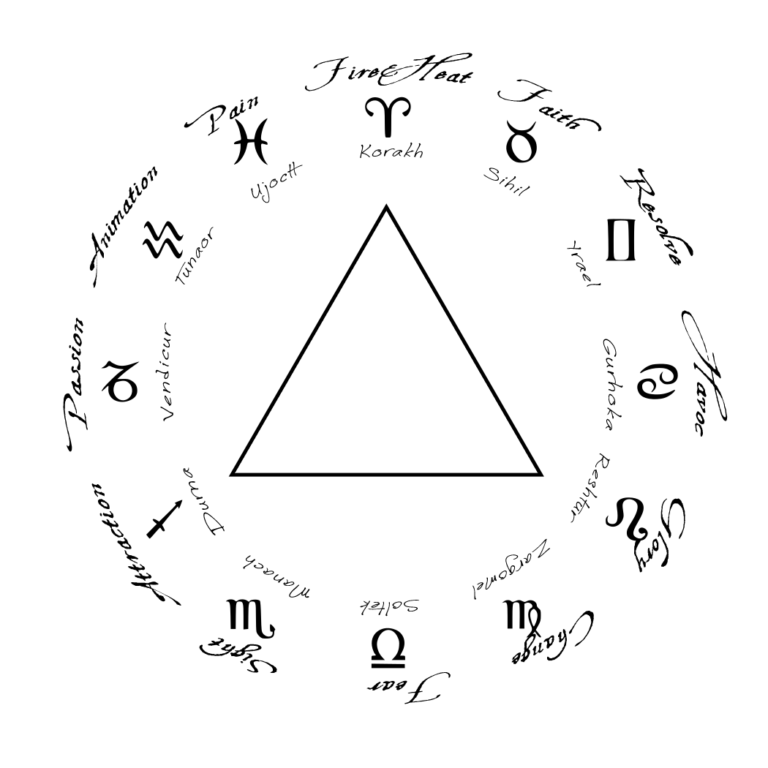
Sight (Manach) – The ability to create bright ambient light as well as see distant locations or targets visually.
Attraction (Durna) – Drawing forth of people or objects to a certain point, either by their own will or by exerting force.
Passion (Vendicur) – Manipulation of emotions to become more intense and fervent than before.
Animation (Tunaor) – Giving the spark of movement under your control to an otherwise inanimate object.
Pain (Ujoctl) – Invoking pure pain, either in the form of trauma or otherwise into a target.
Water
Waves – Faith – Speed – Cleansing – Time – Purpose
Clarity – Reflection – Paths – Balance – Cycles – Pressure
Water (Korakh) – The control of water, pulled from a standing source or out of ambient moisture, and the powerful waves that it forms.
Faith (Sihil) – The Faith Attribute as well as the occasional feat of Faith, such as changing one’s Devotion.
Speed (Yrael) – The Speed Attribute as well as the occasional feat of Speed, such as moving a blinding speed all at once over a certain distance.
Cleansing (Gurhoka) – Removing impurities, contagions, and other negative influences.
Time (Reshtur) – Experiencing events outside of one’s own moment in time.
Purpose (Zargomel) – Accessing and enhancing those things which an object or idea is made to accomplish, or setting a new purpose for those things.
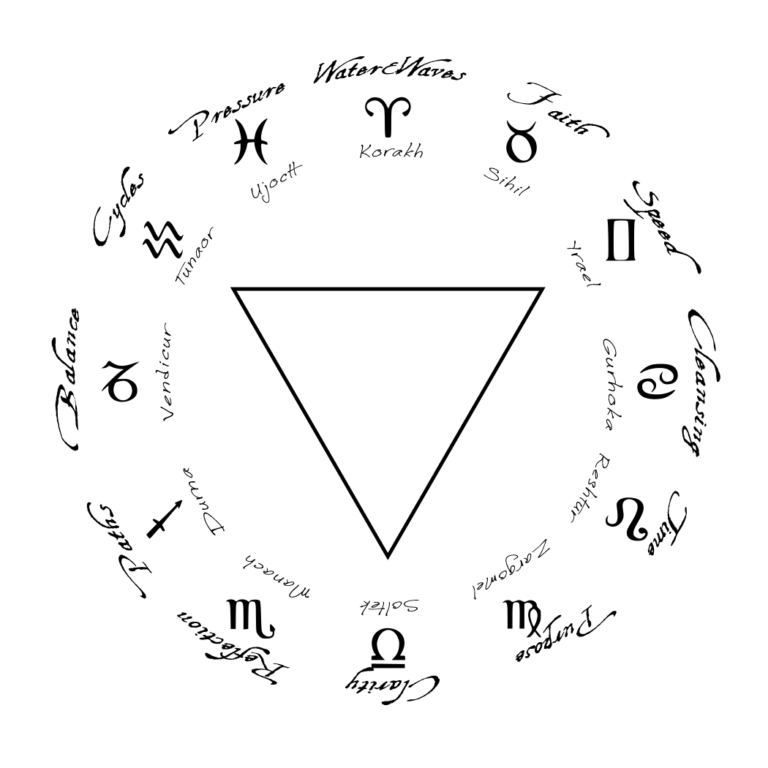
Clarity (Soltek) – Washing away obscurity, illusion and control.
Reflection (Manach) – Reflection of any kind of effect, be it physical, emotional or otherwise.
Paths (Durna) – Manipulating, creating and revealing new and existing paths of travel for people and objects.
Balance (Vendicur) – Maintaining of corresponding effects, opposite effects and evening of distributions.
Cycles (Tunaor) – Manipulation of any cyclical series, anything that happens and un-happens in sequence.
Pressure (Ujoctl) – Exerting the force of great weight upon particular points or places.
Earth
Stone – Fortitude – Strength – Disease – Resistance – Structures
Metal – Animals – Weight – Plants – Force – Rot
Stone (Korakh) – Manipulation of the hard stone, dense turf and grinding sand that makes up the earth.
Fortitude (Sihil) – The Fortitude Prime Stat as well as the occasional feat of Fortitude, such as reinforcing a door or bulwark.
Strength (Yrael) – The Strength Prime Stat as well as the occasional feat of Strength, such as tearing a door from its hinges.
Disease (Gurhoka) – The creation and spread of diseases.
Resistance (Reshtur) – Adding resistance, either physical or otherwise to actions.
Structures (Zargomel) – Creation and revision of buildings, walls, supports, even statues and other creations of rock and stone.
Metal (Soltek) – Manipulation of worked metal, both in shape and function.
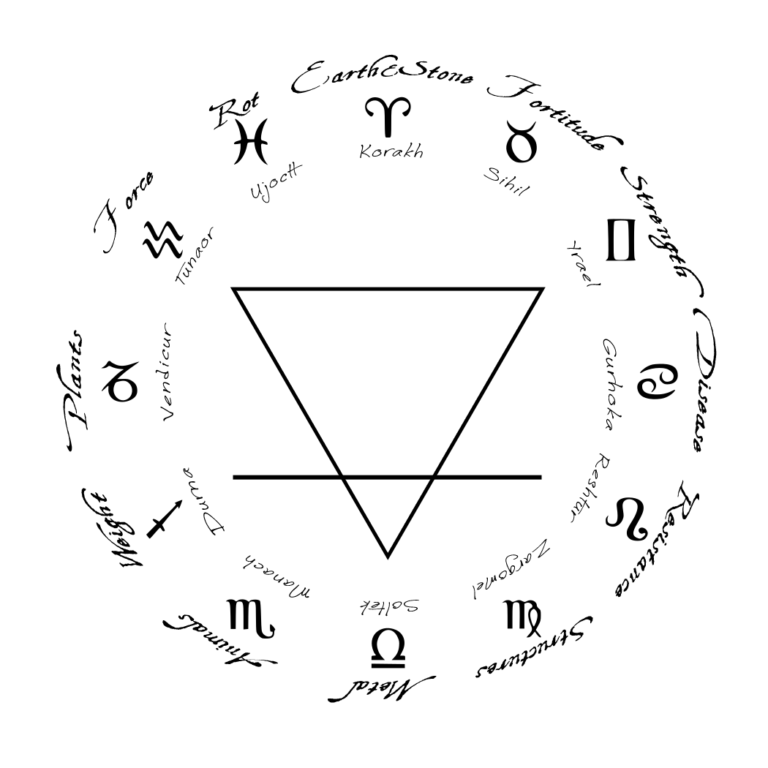
Animals (Manach) – Communicating, commanding and emulating animals. Can add Instincts to a character.
Weight (Durna) – Increasing or redistributing the weight that an object exerts.
Plants (Vendicur) – Stimulating the growth and development of plant life, as well as causing it to behave in unusual or dangerous ways.
Force (Tunaor) – Exerting raw force upon a targeted area.
Rot (Ujoctl) – Rapid decay of organic material such as flesh, wood and leather.
AIR
Wind – Intellect – Speed – Communication – Illusion – Insubstance
Memory – Subtlety – Seeking – Thought – Control – Movement
Air & Lightning (Korakh) – controlling the physical flow of the winds as well as lightning and directing enormous amounts of electrical force into a target
Intellect (Sihil) – The Intellect Attribute as well as feats of intellectual processing such as memorizing a string of 1000 words.
Speed (Yrael) – The Speed Attribute as well as the occasional feat of Speed, such as moving a blinding speed all at once over a certain distance..
Communication (Gurhoka) – Power over language, transfer of ideas, and expressing understanding.
Illusion (Reshtur) – Creation of illusions that fool the mind. Higher Power results in more complex illusions that can move realistically or affect multiple senses.
Insubstance (Zargomel) – The property of intangibility, as well as causing things or concepts to fail or be poorer at the task for which they were designed.
Memory (Soltek) – Reading or creating recall of events in a character’s mind, as well as imprints left behind upon a place or object.
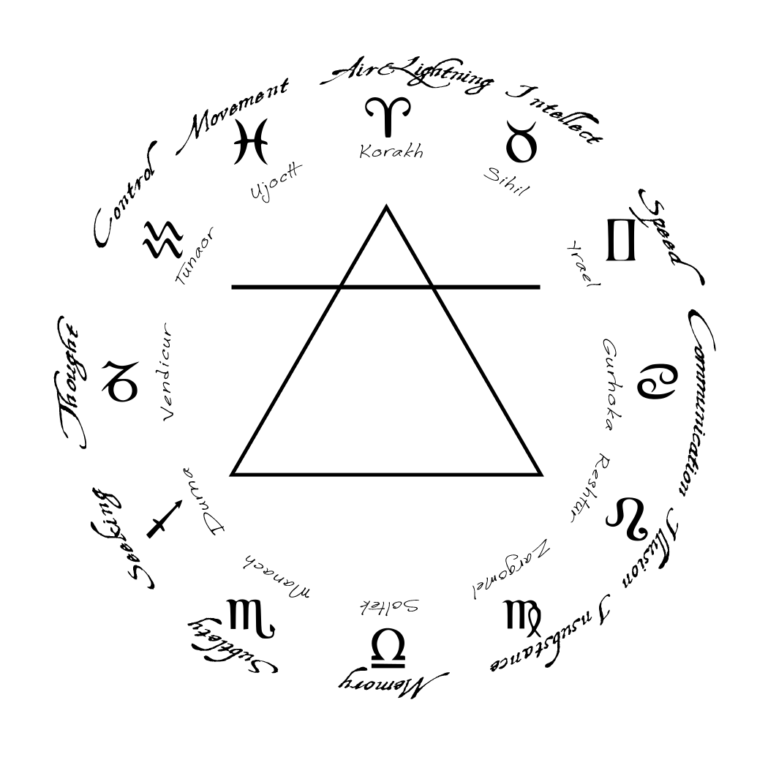
Subtlety (Manach) – Inconspicuousness and unobtrusiveness on a mental level. Causes people, objects or events to become easily ignorable and unimportant.
Seeking (Durna) – Find objects, places, or people that you are familiar with, or where something has gone from a location.
Thought (Vendicur) – Reading and creating current thoughts in the minds of others. Higher Power allows for more believable thoughts to be introduced, or to read more deeply hidden secrets.
Control (Tunaor) – Influencing events through subtle manipulation from many points, causing general trends as well as more direct puppetry through constriction of options.
Movement (Ujoctl) – Control over movement, either as an assistance to a character’s general fluidity, or as a total control of movement over an object.
The Anatomy of a Spell
Spells are made up of the following attributes: Range, Power, and Duration. These determine the overall usefulness and effectiveness of the spell.
This chart shows the three attributes that make up a spell. A Magician may create a spell of any combination of these Attributes, even very powerful ones, but each step up the chart further increases the Complexity of the final result of the spell, which means that an overzealous may not be able to be cast by the Magician who created it – though often such work is exactly what is demanded by a Magician’s superior in higher Circles who have better things to do than spend time in an arcane laboratory performing experiments.
General Spell ANATOMY
| Level | Range | Power | Duration |
|---|---|---|---|
| 10 | Any Plane | Epic + | Forever |
| 9 | This Plane | Epic Effects | Always, while conscious |
| 8 | Local Theater | Mighty +/- Epic | 1 Year and a day |
| 7 | Local Province | Mighty Effects | 1 Chapter (Downtime) |
| 6 | Line of Sight | Greater +/- Mighty | 1 Event |
| 5 | Shouting Range with Accuracy | Greater Effects | 1 Period, around 8 Hours |
| 4 | Shouting Range | Standard +/- Greater | 1 Scene, around an Hour |
| 3 | Oration Range | Standard Effects | 1 Combat Scene, around 10 Minutes |
| 2 | Speaking Range | Lesser +/- Standard | 10 Seconds |
| 1 | Touch | Lesser Effects | Instant |
Power
Power is the useful output of a spell. The higher the Power of a spell, the more powerful the overall effect will be. As long as the effect of the spell falls contextually within the Domain that is being used, the Magician should be able to achieve the result at some level of Power.
Effects fall into specific categories of strength in terms of what game effect is being invoked. Certain calls are considered “Standard” or “Greater” effects by default because of their relative power. Some Domains have more narrow portfolios and so may treat some or all of the effects within their purview as “advantaged” and counting as one grade lower than normal, such as the Pain Domain of Fire and its attendant Pain and Stun calls. Other Domains, such as Fire’s Change Domain, are extremely broad in their possible uses and that breadth causes them to be Disadvantaged in many or all of their effects, counting as one grade higher than normal.
Power Chart
| Power | Description |
|---|---|
| 1 | Lesser |
| 3 | Standard |
| 5 | Greater |
| 7 | Mighty |
| 9 | Epic |
For a full list of what is contained in each grade of Effect and what Domains have what advantages, consult the Arcane Codex.
The levels in between are for those spells that are in some way better or more useful than their ordinary case, or otherwise in some way worse, having some important restriction or limitation on their usual use.
Spells that do not use normal game calls, but instead do some kind of narrative effect, such as gaining information, sending a message, hiding a door, or some other effect are possible at some level of Power, up to Staff discretion based on its overall usefulness and details.
At Mighty or Epic effects, more abstractly defined ideas of the Domain may be acceptable. For instance, a Sight spell typically only affects actual sight and seeing, as well as light. At high levels of Sight, more roundabout uses may be acceptable, such as creating visual illusions by bending light, seeing into the nearby past of an area, gaining a visual understanding of something that is not visual in nature, such as sound, or other eccentric uses.
Range Chart
| Range Level | Description | Examples |
|---|---|---|
| 0 | Personal | This spell is only suitable for affecting the caster directly. |
| 1 | Touch | This spell is delivered by touching the target. In combat situations or with uncooperative targets, this requires a use of a Grab ability from the Brawl skill. |
| 2 | Speaking Range | The call can be delivered at normal conversational volumes, as if speaking to someone across a table. |
| 3 | Oration Range | The call can be delivered at a booming public speaking volume, louder than speaking, but quieter than a shout. This is also the volume necessary for all casting Incantations. |
| 4 | Shouting Range | The spell can be delivered at the loudest volume that the caster can speak it at. |
| 5 | Shouting with Accuracy | The spell can wind over and around unwanted targets. It can be delivered at Shouting range, and the caster can also designate a specific target with the call, identified specifically. |
| 6+ | Ranges above 5 must be delivered with the help of Staff members or Rules Marshals. Spells that deliver “Strike” may not be accurately fired at Ranges above 5. |
Range
The Range of a spell is the distance from the Magician that it can accurately create its effect. The higher the Range attribute of a spell, the farther a spell can effectively be cast. Chaotic situations such as battles can disrupt a spell’s ability to deliver its effect cleanly, while calm and still conditions often allow a spell to track farther with the same Range.
Range is measured in terms of audible volume that the Magician will use to announce the effect, with higher Range values meaning the Magician can announce the effect more loudly.
Since the nature of live-action necessitates that the target hear and understand your effect in order to behave appropriately, the louder and more clearly that a spell can be announced, the more likely it is to affect your target successfully.
Duration
The Duration is simply the length of time that the spell remains in effect. For Enchantments with very long Durations (longer than Duration 6) the effect will be noted on the subject’s character sheet with an expiration time. For any spell to be permitted to be used over the Downtime to mechanical effect, such as increasing a Gathering action or affecting Rulership or other Downtime related systems, it must have at least Duration 7.
Complication
Each spell also has four potential “slots” to add Techniques which may alter or enhance the way a spell functions in a desirable way. These four categories of Techniques are Praxes, Theorems, Forms, and Seals. Praxis Techniques adjust the process of casting itself, making it easier, faster, or safer. Theorems are optimizations to the spell’s effectiveness that grant it new abilities or benefits. Forms change the shape of the spell so that it can affect more targets, as well as concentrate or diffuse an effect. Finally, Seals suspend a spell’s effect until a certain condition is met that breaks the Seal and releases the magic.
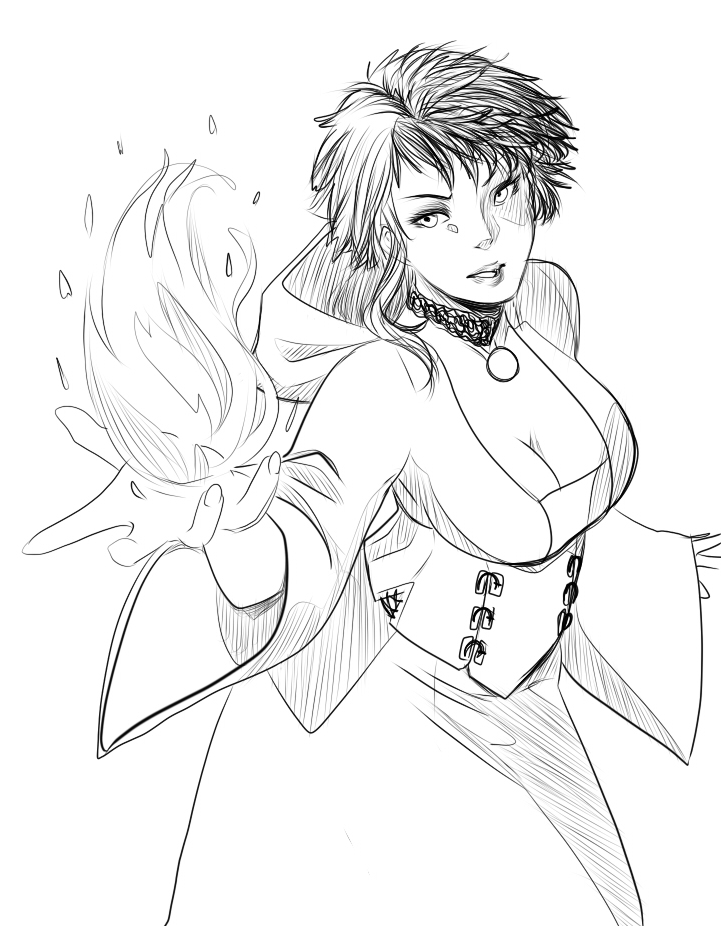
Each slot that the Magician opens within the spell costs 3 Complexity. Once the slot is open, the Magician may work any such Techniques they know into the magic. Such spells, once created, retain these Techniques even when being cast by Magicians who do not know the Technique themselves, for the original architect of the spell has already done the highly technical work of codifying the spell with her acute understanding of magic.
Fallacies
Some spells require great Complexity to achieve their goals, yet thus become unsuitable for the Magicians who must achieve them. The solution to this problem are referred to as Fallacies – impure approaches to magic that rely on shortcuts and workarounds in order to achieve a cheated greatness. Understanding of these enodations comes in the form of Techniques which introduce their concepts. Material Fallacies cause the casting Magician to require specific material components or other physical conditions in order to complete the spell. Casting Fallacies require special conditions in the performance of casting the spell itself, and Energy Fallacies, the most dangerous category, endanger the Magician by rejecting many of the factors that keep a spell’s magical power under control.
Once a Fallacy has been added to a spell, its restrictions must be obeyed in order to cast the spell successfully, but for each Fallacy introduced, the Complexity of the spell is lowered by a commensurate amount. A spell may accept any number of Fallacies, however, it only gets its full benefit from the first Fallacy introduced, half the benefit (round up) of the second, and half again for the third, and so on, to a minimum of 1 Complexity reduction for each additional Fallacy applied to the workings of the final spell.
Each of the restrictions required will be written onto the final Arcanum.
Adjuncts
Adjuncts are a special class of Techniques that pertain specifically to Spellcraft, allowing the Magician to accomplish more than her less educated peers with the same amount of Complexity. The Magician’s mastery of the intricacies of spellwork allows them to lower the total Complexity of the final spells, allows the Magician to enhance her spell without increasing the Complexity, or even open up new possibilities entirely such as blending together Forms or Theorems into more powerful Archforms or Archtheorems that achieve the effects of each. Master Magicians will in some cases write highly calibrated spells for their subordinates to use on their behalf, even while using their Adjuncts to lock out unwanted others, perhaps rivals within other Guilds, from stealing their powerful secret arts.
Spellwork and Crafting the Spell
Once every aspect of the spell has been decided upon, the Magician may spend a Downtime action in Research to actually create the spell. This action requires the use of a Laboratorium, which is usually found within a Magician’s Tower. The Laboratorium contains many tools and chambers suitable for arcane experimentation, as well as specialized scrivening tools that are required in order to create the intricate encoding of the Arcana.
Each class of Laboratoria produce an increasing output of what can overall be called Spellwork. Spellwork includes any one of the following:
- Research a new spell.
- Use the Illation Technique to refine a spell’s efficiency.
- Use the Recalibration Technique to refactor a spell, creating a new Arcanum.
- The final step in this process is choosing an appropriate name for the spell. The spell’s name must be appropriate to the purpose of the spell.
The player of the Magician should submit the full details of their proposed spell to Staff during the Downtime where it can undergo final approval and be recorded in our registries. Staff will provide the player with the unique Arcanum that represents their spell, which can be added to their spellbook.
Spellwork does not always result in the Magician’s original idea being arriving perfectly formed. Various factors, including misunderstandings and unanticipated complications may result in some factor of the spell, often its exact Game Effect call or the Power necessary for the spell’s Effect, to be not what was anticipated. In this case, the Player may either accept the spell as granted, or abandon the Spellwork, but they may not engage in negotiations or adjustments. In some cases the spell is not possible at all given the Domains or other restrictions, and the Spellwork fails.
